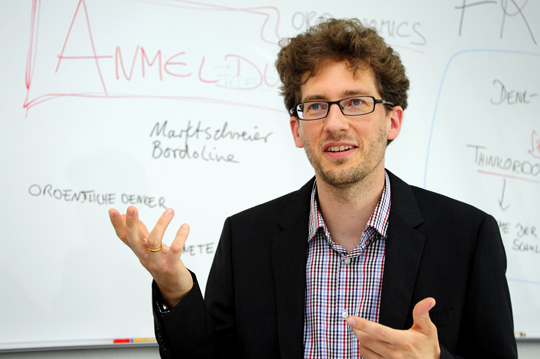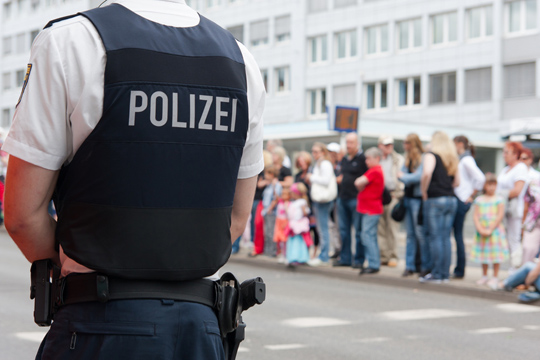An Economist's Obligation
Freiburg, Mar 21, 2017
After the attack on the Christmas market on Berlin's Breitscheidplatz in December 2016, economist Tim Krieger formulated "Acht Thesen zu Antiterrorpolitik" (Eight Propositions on Anti-Terror Policy). In this work, the holder of the Wilfried Guth Endowed Chair for Constitutional Political Economy and Competition Policy at the University of Freiburg describes typical mechanisms of public reaction and the political processes that follow. These responses often lead to decisions that seem inappropriate when viewed from a scientific standpoint. Thomas Goebel asked the researcher why he views most of the security measures as being of little use.
 A calm, authoritative communication from the state and a clean investigation are decisive in responding to terrorist attacks, says Tim Krieger. Photo: Thomas Kunz
A calm, authoritative communication from the state and a clean investigation are decisive in responding to terrorist attacks, says Tim Krieger. Photo: Thomas Kunz
Mr. Krieger why is an economist occupied with the question of how policymakers and society should react to terrorist threats?
Tim Krieger: Perhaps it's not obvious at first glance, but the terror debate has economic components. These arise, for instance, when you begin to question the causes. For example, there's a theory around that unemployment, inequality and poverty are among the triggers of terrorism. Those are issues that economists know something about. A second important point is the cost-benefit analysis of measures taken to prevent terrorism. Add to that methodological approaches, such as game theory, for instance. How do policymakers, the media and the public react to such shocks and how do the incentives change on all sides? Will, for example, the policy taken toward terrorists actually be as hard-lined as politicians say it will be, if a government minister is kidnapped? How do terrorists react when their targets are better protected? Do they then choose alternative targets, and if yes, which ones?
You maintain that attacks like these lead to an exaggerated fear of terrorism.
That's a psychological effect. Human beings are poor at assessing events that occur very rarely. And if the events are something dreadful and stir the emotions, as terrorist attacks are, then the probability of such an event occurring appears larger than it really is.
Is that because there isn't any routine for handling them, unlike traffic accidents, for instance?
Precisely. And the images in the media amplify the effect. Part of the impact of the terrorist attack on the Christmas market in Berlin came because many people had been at Christmas markets beforehand themselves.
The terrorists were out to get just those shocking images and the sense of insecurity they produce.
Yes, they use the way humans tend to react to things strategically. They want to make people feel unsafe everywhere.
What are the consequences of that?
Feeling unsafe can hamper the economy. Yet the political system reacts with a particular intensity because the demand for security rises. Studies have shown that the probability of a government's reelection decreases significantly after a terrorist attack. That is why policymakers often try to show strength and react with high-profile security measures.
 Source: Heiko Barth/Fotolia
Source: Heiko Barth/Fotolia
What are your criticisms of these?
The measures are above all expensive and ultimately achieve little. Of course you can have someone positioned everywhere who stands guard, but when you take those people away again, the security goes with them. That's unsustainable.
But don't policymakers have to pay attention to vague fears, too? Even an imagined threat can reduce quality of life.
Naturally, the state must function to protect its citizens. That's what its there for. The question is just a matter of how. People are reassured when they see police officers. Yet at the same time, that's not very effective. On the other hand, it's known that preventive measures work relatively well, but they take a great deal of time. As a rule, that's not what people are demanding after an attack.
What do you believe is appropriate?
In any case, I think calm, authoritative communication from the state and a clean investigation are decisive. This shows the public that the state basically has the situation under control, even despite the fact that the risk of an attack always remains. People are ultimately better at handling that than they would be if the state seemed to be systematically overwhelmed, as we are seeing at the moment in the debate about the apparent failure of government authorities.
Nevertheless, you say that terrorism can only be sustainably controlled if its causes are eliminated.
Belgium and France first and foremost have "home-grown" terrorism which is related to tendencies towards exclusion in these societies. And the prisons are breeding grounds for radicalization. Policymakers can address that if they want to. What's more difficult is when terrorists come in from abroad and, for example, shift the fighting from Syria into western societies for strategic reasons. Because there's no end to the conflict in Syria in sight, the only thing likely to help at the moment is police and intelligence work. But in then end, "Islamic State" itself will begin to have a problem if there are fewer frustrated, easily radicalized people who want to become terrorists where we are.
What are the chances of moderate voices being heard when emotionally loaded issues such as the risk of terrorism and immigration are heard in the same breath in the current parliamentary election campaign?
That's going to be tough, but the issue isn't so volatile at the moment because the media and society are so intensely occupied with Mr. Trump. Otherwise, the debate would probably look very different. But the late Herbert Giersch, the legendary president of the Kiel Institute for the World Economy always said, "Economists have an obligation. We must supply something to help the population." That's why we scholars should at least contribute our arguments to the debate.

